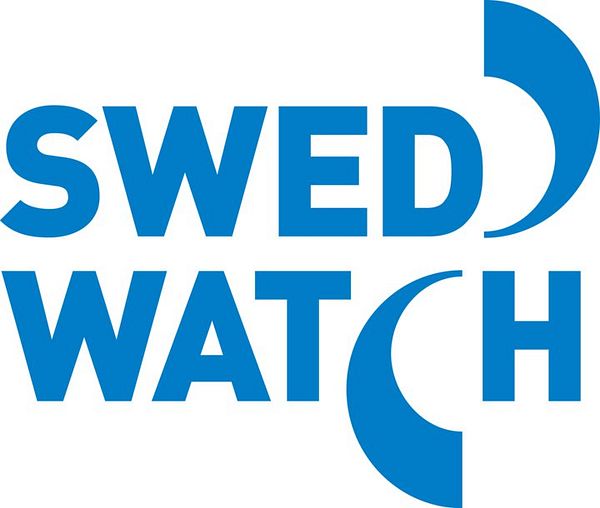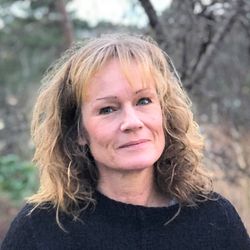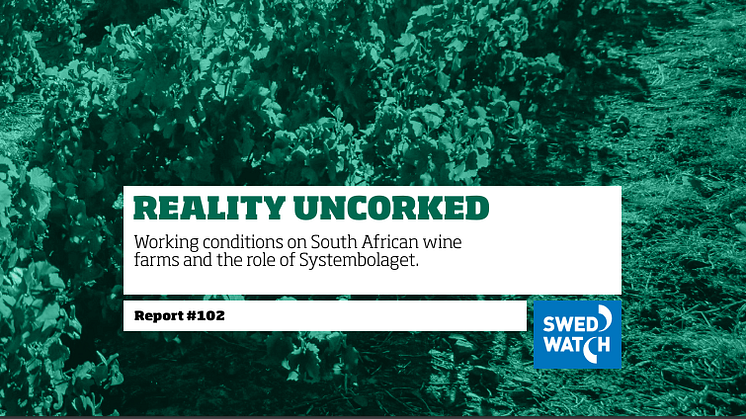
Pressmeddelande -
Reality Uncorked: New Swedwatch report highlights human rights issues in state-owned Systembolaget´s wine supply chain and calls for strengthened sustainability efforts
The new Swedwatch report, based on interviews conducted at four farms in the Western Cape in South Africa by Swedwatch's project partner ILRIG (The International Labour Research and Information Group), reveals pressing human rights violations, including harassment and threats, and health issues resulting from pesticide exposure – and urges state-owned wine retailers such as Systembolaget to conduct heightened due diligence.
A newly released report by Swedwatch, “Reality Uncorked: Working conditions on South African wine farms and the role of Systembolaget”, focuses on the working conditions at farms in South Africa's wine industry - where violations of farm workers´ rights resulting from business practices have been well documented in the past - and the role and responsibility of Sweden's state-owned alcohol retailer Systembolaget. South Africa, a major supplier of wines to global markets, accounts for 8-9 percent of Systembolaget's wine sales.
Due to reports of severe harassment and threats by a farm owner against workers at one of the farms, the names of the companies, as well as those of farms, producers and other supply chain actors are omitted from the publication for worker´s safety.
Violations reported by the interviewed workers include substandard wages, poor housing conditions, discrimination by employers to counteract unionization, and illness due to exposure to hazardous pesticides.
“The testimonials in the report are alarming, not least the harassment, threats, and exposure to hazardous chemicals. The findings also indicate that actions taken by companies, including Systembolaget, to fulfil their responsibilities in accordance with international guidelines have so far fallen short”, says Alice Blondel, Director of Swedwatch.
While the research findings should not be considered as representative for the nation’s entire wine sector nor for Systembolaget’s overall supply chain, they nevertheless indicate that these risks and impacts must be addressed as a matter of urgency.
“Systembolaget, a state-owned company, should take additional steps to act as a catalyst for positive change in the wine industry and re-evaluate how they can improve working conditions and mitigate risks for farm workers in their supply chain”, says Alice Blondel.
A total of 19 workers, five of them women, were interviewed on four different wine farms during May 2023 – all of which supply grapes for prominent wineries which, in turn, produce well-established wines retailed by Systembolaget and elsewhere. The two companies respectively owning one and three of the visited farms are certified by the Wine and Agricultural Ethical Trading Association (WIETA). The company owning three of the visited farms also owns several other farms and wineries in South Africa and has grown to become a leading player in the market.
Swedwatch has previously reported on the human rights and labour rights abuses faced by workers in the wine industry in so-called “high risk countries”. In 2013, Swedwatch published its first investigation into, among other actors, Systembolaget’s sustainability efforts. A follow-up report was published in 2015.
The findings of the current report “Reality Uncorked” also draw on previous research in South Africa conducted by international labour rights and human rights organisations, including reports published by the Finnish non-profit organisation Finnwatch in early 2023 and the Dutch-based Centre for Research on Multinational Enterprises (SOMO) in 2020.
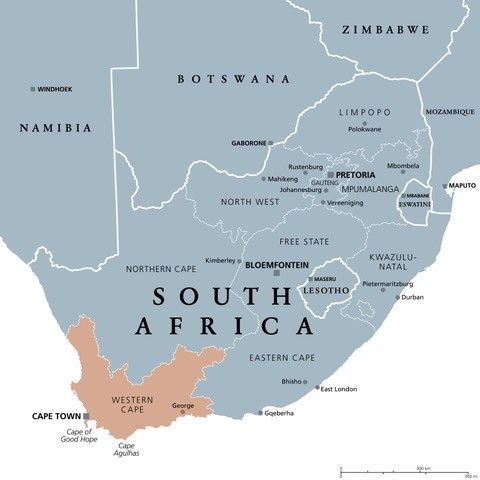
Human rights abuses documented in the report
ILRIG has been working with farm workers and their unions for several years and according to Shawn Hattingh, Research and Education Officer at ILRIG, the situation for farm works in South Africa is often very bad.
“Generally, conditions for farm workers are dire in South Africa and this situation too was found at the four farms we visited for the Swedwatch´s report. Perhaps most disturbingly, at one of the farms, shop stewards had laid grievances about living and working conditions and in response the owner threatened them and attempted to incite some of the employees to violently attack the shop stewards. Unfortunately, threats of violence, or actual violence, towards farm workers is all too common”, says Shawn Hattingh.
Lack of living wages was another issue. While most of the workers interviewed noted that they earned the minimum wage - which in 2023 equaled to €1.24 an hour – all of them indicated that this was too low and insufficient to support their families properly.
“At both companies it was clear that the wages being paid – which were mostly the minimum wage – could not meet the needs of workers and many battled to properly feed their families, buy clothing and even buy textbooks for their children” says Shawn Hattingh.
The farm workers interviewed also described housing conditions on the farms as a major cause for concern. Shawn Hattingh:
“On all four farms there were also problems with the housing, which included cases of mould on the ceilings, cracks in the walls and rising damp. At both companies, asbestos was still being used for ceilings or roofs of some of the houses. Plumbing was a major problem at one of the farms, where the yards around worker housing were regularly flooded by foul smelling water.”
Another finding concerns the workers’ exposure to hazardous pesticides. Farm workers in South Africa have been raising the alarm about the health impacts of pesticides used in the country for years. In some cases, pesticides that are banned in the EU, classified as harmful to the environment and health, are still manufactured in Europe and exported to countries in the Global South, including South Africa, resulting in exposure to hazardous substances and related health impacts. Workers interviewed for this publication confirmed this problem.
The interviewed workers described how the tractors used for spraying were covered and the drivers were protected, but that tractors would occasionally spray right next to or near unprotected farm workers without notifying them. Warning systems that had been used previously were reportedly no longer in use. One worker said:
‘They used to put up red flags where they were spraying so you stay clear. Now though they no longer use red flags.’
Another worker stated: ‘They spray next to us and, depending on where the wind is blowing, it can blow over us.’
Workers also explained how their housing was located very close to the vineyards so that, when agrichemicals were sprayed on the crops, the fumes drifted into their houses. Sometimes this spraying was done early in the mornings when the workers and their families were still at home.
This echoes similar findings by Finnwatch in 2023, with workers describing how they were exposed to pesticides either while working or near their houses and experienced problems such as rashes, flu-like symptoms, headaches, nausea and eye irritation.
Previous research by SOMO has highlighted how women face more significant health risks as they are often sent back into the vineyards directly after crops have been sprayed. These women typically find it difficult to refuse this order, because – as opposed to the men – they mostly operate as seasonal workers and/or labour broker workers and are thus more vulnerable to being dismissed or not being re-hired in the future.
Unionisation among agricultural workers in South Africa is low, with estimates suggesting that only ten percent of workers in the Western Cape are unionised. It has previously been reported that many workers are afraid to join a union for fear of losing benefits or facing other potential repercussions.
It is evident that, at both the companies studied, although workers could join unions, union members were discriminated against and treated differently to non-union members, says Shawn Hattigh.
“At one of the companies, workers had even been offered money to leave the union”.
Lack of transparency
At the time of the research of the report, Systembolaget had 30 suppliers sourcing wine from South Africa – only half of them agreed with Systembolaget´s request to share their supply chain data with Swedwatch.
-This is very alarming and something we hope Systembolaget will address promptly. Supply chain transparency is crucial for civil society actors and other stakeholders to identify and scrutinize companies, not least when concerning wines marketed as sustainable, says Alice Blondel.
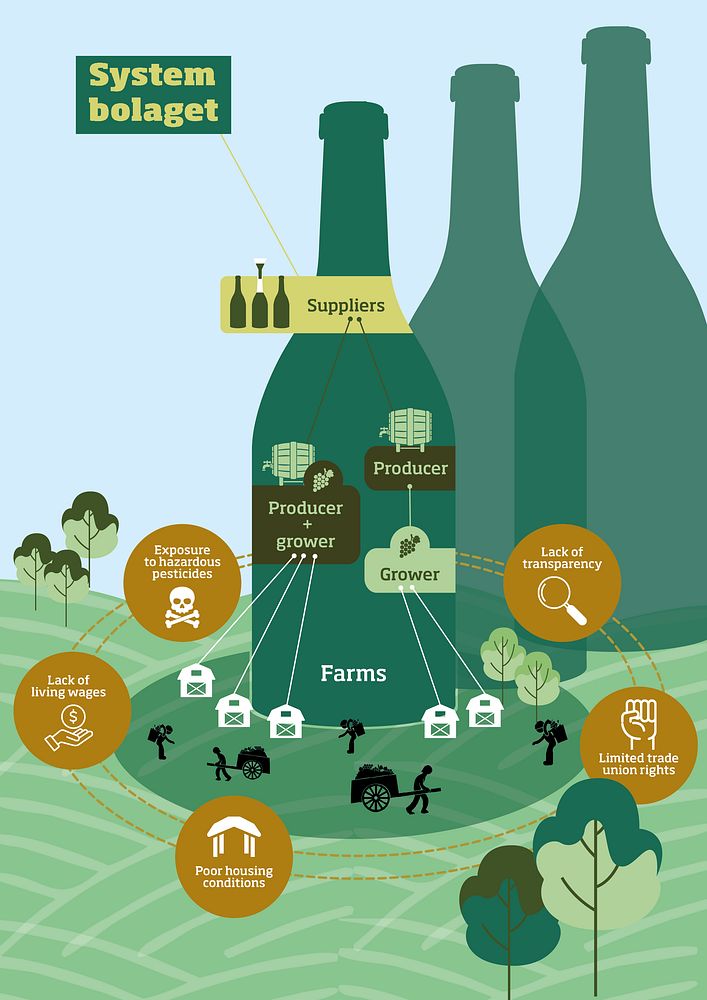
The response from Systembolaget
In its response to Swedwatch, Systembolaget acknowledged the research findings as issues it is aware of and has continuously been working on. It also referred to the company's human rights and environmental due diligence processes (HREDD) as being in line with international frameworks, as well as referring to its code of conduct that reportedly must be approved and followed by all of its suppliers.
However, the problems highlighted in this report would likely have been addressed if the due diligence process of retailers such as Systembolaget and other supply chain actors had been more rights-based and result driven.
- Systembolaget, as a state-owned retail monopoly not driven by profit or sales, is in a unique position to set the bar higher and could truly act as an agent for change for improved working conditions, deepened stakeholder engagement and increased supply chain transparency, says Alice Blondel.
Swedwatch recommendations
Swedwatch recommends Systembolaget, and its counterparts outside of Sweden, to implement heightened HREDD processes tailored for high-risk environments. The process should also be strengthened to specifically address the risks faced by women, and by human right defenders.
Systembolaget should use its leverage to enable decent work across its supply chain, while also improving transparency towards consumers and the wider public around the production conditions linked to the wines it is selling.
-With the EU's flagship directive on Corporate Sustainability Due Diligence formally approved, the Swedish government must now enforce these rules in a way that holds Systembolaget accountable for its due diligence efforts, says Alice Blondel.
The detailed recommendations for Systembolaget and the Swedish government can be found in the report, as well as the replies from Systembolaget.
Systembolaget has also provided a statement after they have read the finalized report. The statement as well as the full replies from Systembolaget can be found at swedwatch.org.
The report and the statement from Systembolaget are also attached.
FACT BOX – Business responsibilities regarding the supply chain
In accordance with the United Nations Guiding Principles on Business and Human Rights (UNGPs) and the Organisation for Economic Co-operation and Development (OECD) Guidelines for Multinational Enterprises, companies bear a clear responsibility to address, mitigate, and remediate any adverse impacts on human rights and the environment within their supply chains.
FACT BOX - Swedwatch
Swedwatch is an independent, non-profit research organisation striving to empower rights holders and to promote responsible business practices. Through research and dialogue, Swedwatch highlights the impacts on people and planet by unsustainable business operations, and builds bridges between stakeholders in order to affect change.
Since 2003, Swedwatch has conducted research in over 40 countries and published over 100 reports on corporate impact across various sectors concerning human rights and the environment.
Swedwatch’s work is based on internationally recognised frameworks, as outlined in international human rights law, environmental laws and standards, international conventions and other voluntary standards.
For more information and interviews with ILRIG and/or Swedwatch please contact Ami Hedenborg, Media Manager Swedwatch, +46 709 32 92 49, ami@swedwatch.org
Ämnen
Kategorier
Swedwatch är en ideell och politiskt obunden researchorganisation. Vårt mål är att företag, investerare och stater ska ta ansvar för mänskliga rättigheter och miljö och att rättighetsinnehavare kan göra sina röster hörda.
